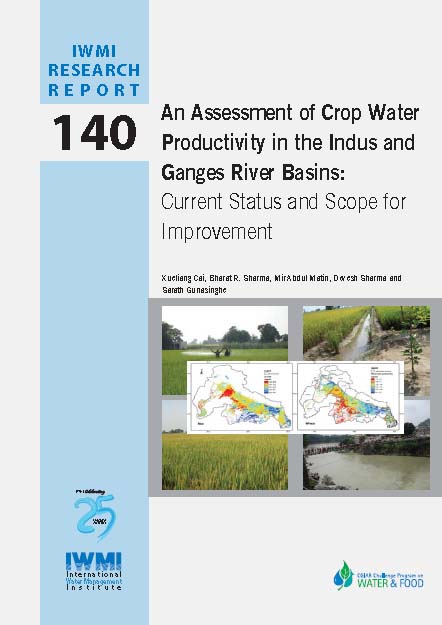Research Papers
Traditional knowledge used in paddy cultivation in Raipur district of Chhattisgarh – A paper in the Indian Journal of Traditional Knowledge
Posted on 22 Apr, 2011 07:42 PMRice is the main crop cultivated in the State and several indigenous technologies are being used by farmers for seed germination, preventing the crop from insect/pest attack in the field as well as for storage.
An assessment of crop water productivity in the Indus and Ganges river basins: Current status and scope for improvement – A research report by IWMI
Posted on 20 Apr, 2011 06:43 PM This approach is based on the integration of readily available remote sensing, national crop productivity and land use statistics and weather data.
This approach is based on the integration of readily available remote sensing, national crop productivity and land use statistics and weather data.
Traditional fishing techniques of tribes in Bastar region of Chhattisgarh – A paper in the Indian Journal of Traditional Knowledge
Posted on 20 Apr, 2011 07:52 AMTribal habitat and rich primitive culture covers many traditions and fish is an integral part of the tribal food habit since times immemorial in this region. The life of tribes mainly depends on naturally available foods which can rarely be reaped in other places. The fishing techniques are specialized according to structure, size of stream, season and species of fishes intended to be harvested.
Drinking water quality monitoring and development of surveillance mechanisms - A pilot study done by NEERI in New Delhi
Posted on 20 Apr, 2011 02:30 AMThe WHO guidelines for drinking water quality aim to protect public health and the key way to ensure this is through the adoption of Water Safety Plans (WSP). WSP includes setting of health targets, risk analysis and its assessment to identify priority hazardous scenarios and management of the risk.
Assessing acute Gastroenteritis risks associated with water quality and sanitation in Hyderabad city - A paper by the Institute of Health Systems (IHS)
Posted on 19 Apr, 2011 11:35 PMThe quality of drinking water is a vital element of public health and well-being. The most effective means of consistently ensuring the safety of a drinking-water supply is through the use of a comprehensive risk assessment and risk management approach that encompasses all steps in water supply from catchment to consumer.
WHO guidelines on water quality term these approaches as water safety plans (WSPs), developed to organize, systematize and apply management practices in drinking-water quality.
Interventions that make agriculture sustainably high-yielding, eco-friendly and empower small-holder farmers - A research paper (2009)
Posted on 19 Apr, 2011 04:18 AMStating that modern agriculture increases production cost, the author observes that productivity of the same crop was higher in pre-British times than what it is now with modern agriculture techniques.
As these old agricultural techniques have not been scientifically researched there is a lot of scepticism which also results in them not being promoted. The paper lists out agricultural techniques, which result in sustainable high yields and are accepted by the scientific community.
Comparing conventional and organic farming crop production systems - Inputs, minimal treatments and data needs - A research paper
Posted on 19 Apr, 2011 02:45 AMThe following article is based on a field experiment in International Crops Research Institute for the Semi-Arid Tropics (ICRISAT), where low cost farming systems that involve use of biological inputs obtained from the field is compared with conventional farming.
Further, the authors offer suggestions for future demonstration and verification experiments, to study the virtues of organic farming.
Comparing soil properties of farmers’ fields growing rice through SRI and conventional methods - A research paper
Posted on 19 Apr, 2011 02:00 AMThis paper was presented at the first National Symposium on System of Rice Intensification (SRI) – Present Status and Future Prospects held in 2006. The parameters include thirteen soil properties which included six related to cultureable microorganisms, three root-related parameters and yield.
Lessons from non-chemical input treatments based on scientific and traditional knowledge in a long-term farming experiment - A research paper
Posted on 19 Apr, 2011 12:32 AM
Two of the four systems are low-cost farming methods which are based on traditional and scientific knowledge on using crop residues, farm-waste, compost, Gliricidia lopping, bacterial inoculants, and herbal extracts as nutrients to nourish the soil, and as biopesticides to manage pests.
The third system is conventional agriculture which is the "control" and receives chemical input as suggested by research institutions depending on crop type. The fourth is a combination of the first three.
Indigenous pest management practices prevalent among hill farmers in Uttarakhand – A paper in the Indian Journal of Traditional Knowledge
Posted on 17 Apr, 2011 04:57 PMThis paper in the Indian Journal of Traditional Knowledge aims to describe indigenous pest management (IPM) practices being followed by farmers of Bageshwar district of Uttarakhand and their belief behind following them.With those practices, farmers would manage pests effectively without deteriorating environment. These practices could be very important if incorporated into integrated pest management research to enrich the research process and make it more relevant for the farmers.